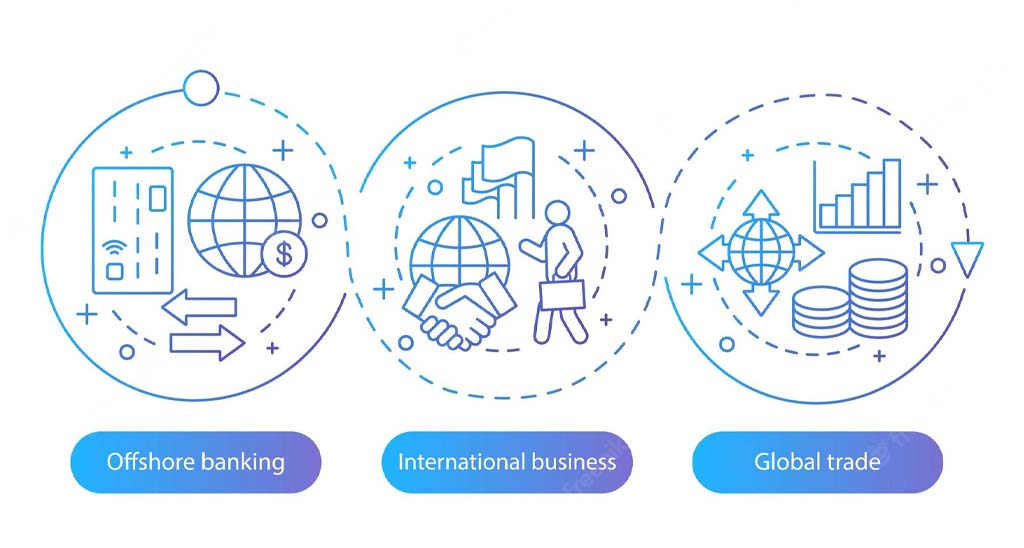Offshore banking can be a great way to access banking services and take advantage of certain benefits that you may not be able to get in your home country. But where do you start? How do you open an offshore bank account? What types of accounts are available? And what are the regulations and taxes associated with offshore banking? In this blog article, I’ll answer these questions and more as I take you through everything you need to know about offshore banking.
What is Offshore Banking?
Offshore banking is the practice of opening and using a bank account in a country other than the one in which you reside. This practice is popular among those who seek to diversify their investments and take advantage of the different banking services and opportunities available in other countries.
Offshore banking can also be used to protect assets from taxation or economic instability in their home countries. Those who open offshore bank accounts often seek to take advantage of the lower taxes, higher interest rates, and increased privacy associated with banking in foreign countries.
However, offshore banking is not without its risks, as depositors may not have the same protections as they would in their home country. As with any financial decision, it’s important to understand the risks and benefits associated with offshore banking before opening an offshore bank account.
Benefits of Offshore Bank Account
One of the major benefits of offshore banking is the potential for higher interest rates. While the interest rates available in your home country may be low, offshore banks may offer higher interest rates, which can help to increase the return on your investments.
Offshore banks may also offer access to different investments and services, such as foreign currencies, special investment vehicles, and other services. This can be a great way to diversify your investments and take advantage of opportunities available in other countries.
Finally, offshore banking can help to protect your assets from economic instability or political turmoil in your home country. By opening an offshore bank account, you can have peace of mind knowing that your money is safe and secure.
What You Need to Know Before Opening an Offshore Bank Account
Before opening an offshore bank account, it’s important to understand the regulations and taxes associated with offshore banking. Depending on the country where the offshore bank account is located, different regulations and taxes may apply. It’s important to research the regulations and taxes of the country where the offshore bank account is located and understand how they will affect your investments.
It’s also important to understand the risks associated with offshore banking. While offshore banking can be a great way to diversify your investments and take advantage of different opportunities, there are also risks associated with depositing funds in an offshore bank. It’s important to understand these risks before opening an offshore bank account.
Finally, it’s important to understand the fees associated with offshore banking. Different banks may charge different fees for different services, such as currency conversion, wire transfers, and other services. It’s important to research the fees associated with offshore banking and select a bank that offers the services you need at a reasonable cost.
How to Open an Offshore Bank Account
Opening an offshore bank account is not as difficult as you may think. Most banks have an online application process that allows you to open an account in a matter of minutes. However, before applying for an offshore bank account, it’s important to do your research and find the best bank for your needs.
When selecting an offshore bank, it’s important to consider factors such as fees, interest rates, customer service, and security measures. It’s also important to understand the regulations and taxes associated with the offshore bank and make sure that it’s a bank you can trust.
Once you’ve selected an offshore bank, the next step is to complete the application process. You’ll need to provide the bank with personal information, such as your name, address, and passport number. You may also need to provide proof of income or other documents. Once the application is approved, you’ll be able to access your offshore bank account and start taking advantage of its benefits.
Different Types of Offshore Bank Accounts
When opening an offshore business or personal bank account, you’ll have a variety of account types to choose from. Each type of offshore bank account has its own set of benefits and risks, so it’s important to understand the different types before selecting one.
The most common type of offshore bank account is a savings account. These accounts are great for those who want to save money or invest in the foreign currency of the country where the offshore bank is located.
Another popular type of offshore bank account is a checking account. This type of account is great for those who want to make international transactions or send money abroad.
Finally, offshore banks may also offer special investment accounts, such as mutual funds or hedge funds. These accounts can be a great way to diversify your investments and take advantage of different opportunities in foreign markets.
Regulations and Taxes Associated with Offshore Banking
It’s important to understand the regulations and taxes associated with offshore banking before opening an offshore bank account. Different countries have different regulations and taxes, so it’s important to understand the regulations and taxes of the country where the offshore bank is located.
In general, offshore banks are subject to the same regulations and taxes as banks in their home countries. However, some countries may offer special tax incentives for those who open offshore bank accounts, such as lower taxes on interest income. It’s important to understand the regulations and taxes of the country where the offshore bank is located before opening an offshore bank account.
Finally, it’s important to understand the reporting requirements associated with offshore banking. Offshore banks may be required to report their activities to their home countries, which could lead to tax liabilities. It’s important to understand the reporting requirements before opening an offshore bank account.
The Best Offshore Banks
When selecting an offshore bank, it’s important to find the best bank for your needs. The best offshore banks offer competitive interest rates, low fees, and excellent customer service.
It’s also important to find a bank that is well regulated and has a good reputation. The best offshore banks are regulated by the local government and have a good track record of protecting their customers’ funds.
Finally, it’s important to find a bank that offers the services you need. Different banks offer different services, such as currency conversion, wire transfers, and other services. It’s important to find a bank that offers the services you need at a reasonable cost.
How to Find the Best Offshore Bank Account for Your Needs
When looking for the best offshore bank account for your needs, it’s important to consider factors such as interest rates, fees, customer service, and security measures. It’s also important to understand the regulations and taxes associated with the offshore bank and make sure that it’s a bank you can trust.
The best way to find the best offshore bank account for your needs is to research the different banks available and compare their services and fees. You can also read reviews of different offshore banks to get a better understanding of the services they offer.
Once you’ve done your research and selected the best offshore bank for your needs, the next step is to complete the application process. Most banks have an online application process that allows you to open an account in a matter of minutes.
Steps to Opening an Offshore Bank Account
Once you’ve completed the research and selected the best offshore bank for your needs, the next step is to open an offshore bank account. Here are the steps you’ll need to take:
- Gather the necessary documents. You’ll need to provide personal information, such as your name, address, passport number and your background. You may also need to provide proof of income or other documents.
- Select the type of account. Different types of offshore bank accounts have different benefits and risks, so it’s important to select the best account for your needs. You may consider incorporating a company offshore first.
- Complete the application process. Most banks have an online application process that allows you to open an account in a matter of minutes.
- Fund the account. Once the application is approved, you’ll need to fund the account. You can do this by transferring funds from an existing account or by sending a wire transfer.
- Start using the account. Once the account is funded, you’ll be able to start using it to make international transactions, send money abroad, or invest in foreign currencies.
Additional Steps to Help Ensure Approval of Your Offshore Bank Account
Transparency is key when it comes to opening a business or personal offshore bank account. Banks will require a full understanding of your business, including its size, complexity, structure, economic significance, risk profile, and business model. This will help them to assess the risk associated with accepting you as a customer and determine if opening an account is the right decision. In order to lower your risk profile consider providing the following:
- Consider obtaining a legal opinion from an experienced lawyer, justifying the legal, economic, and tax component of the corporate structure.
- Expanding the company’s online presence:
a) Create Business Pages: Google My Business, LinkedIn, Facebook;
b) Product/Service Reviews: Yelp, Trust.pro, Glassdoor, Trustpilot;
c) Article/Interview/Press Release in popular online magazines. - Expanding of local presence and substance in the country of incorporation by joining in the local professional organizations and associations.
- Consider also opening a person account with the same offshore bank.
- Plan to provide proof of actual business operations (invoices, contracts, agreements, shipment documents, bank/card statements, etc.).
- Prepare a certified Corporate Structure.
- Audited Financial Statements (if available).
- Personal Good Standing Report from each director.
In Conclusion
Offshore banking can be a great way to diversify your investments and take advantage of the different services and opportunities available in other countries. However, it’s important to understand the risks and benefits associated with offshore banking before opening an offshore bank account.
When opening an offshore bank account, it’s important to research the different banks available and compare their services and fees. You should also understand the regulations and taxes associated with the offshore bank and make sure that it’s a bank you can trust.
Once you’ve done your research and selected the best offshore bank for your needs, the next step is to complete the application process. Most banks have an online application process that allows you to open an account in a matter of minutes.
Now that you know the basics of offshore banking, you’re ready to open an offshore bank account! With the right research and preparation, offshore banking can be a great way to diversify your investments and take advantage of the different opportunities available in other countries.



